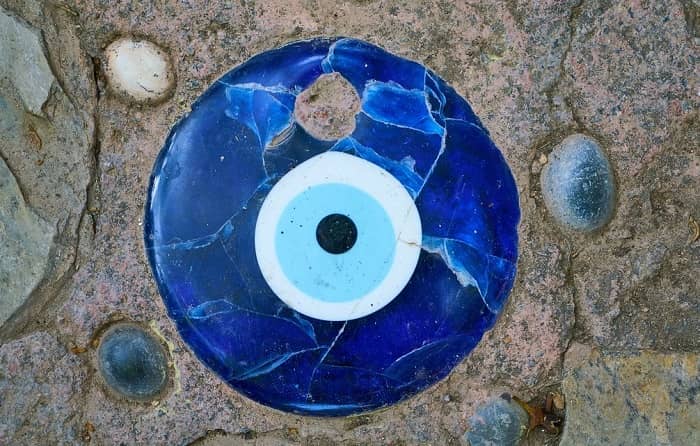About the Turkish Blue Eye (Nazar Boncugu)
If you find yourself with a sudden run of bad luck, or the target of an envious person, invest in a blue Turkish evil eye. Also known as the Nazar Amulet, or Nazar Boncugu, some use this item as a talisman, while others use a good luck charm. Any visitor on a trip to Turkey will see it everywhere, from jewellery shops to offices to homes and even worn by some as jewellery.
It is the most popular souvenir sold in various forms. Instantly recognisable by its blue, white, and turquoise circles, locals in some places still use it culturally and give at weddings and births. In contrast, others brush it off as pure superstition and use it for symbolic décor or aesthetic purposes only. But what is the meaning and history behind it, and is it worth wearing one?

About the Turkish Blue Eye (Nazar Boncugu)
1: Nazar Meaning
The meaning is clear in the name. Not that the actual item is evil, but folklore promotes it as something to ward off the gaze of misfortune, jealousy, envy, negative energy such as hate, and spite. Some believe they are talismans, which ward off a curse and bring blessings and positive energy at the same time. For example, a dear friend might give it to the bride in case she is the envy of other women who wish to get married. Likewise, when a child is born, it is of pure innocence, hence the lucky-charm is protection against negativity surrounding them.
2: History of the Evil Eye
Although it is widely popular in Turkey, it appears in many cultures, including Middle Eastern and Mediterranean countries, and Hebrew texts of Judaism. There are also Buddhist and Tibetan versions. Some research shows the eye-protection first appearing in classical Greece, but other publications suggest its origins lay in North African countries and Egypt. Some connections also compare it to Medusa. After Perseus cut her head off, anyone looking into her mystical eyes, which brimmed with evil energy, turned to stone; hence the eye symbolises the act. The reason for the colour blue is unclear, but in ancient times, many Turkish urban legends suggested anyone who had blue eyes was full of evil spirits. Regardless, its cultural importance is still significant enough for UNESCO to list the beliefs, practises and craftmanship on their intangible heritage list. In the Anatolian area of Cappadocia, many trees also have the blue sapphire charm hanging off the branches.

3: Buying the Nazar Symbol
So, to own an eye symbol, where should you go, and what form should you choose? Well, the good news is the choice is endless, and many places sell them. For home decoration, if you find yourself in Izmir, take a trip to the Aegean Gorece neighbourhood to see handmade eyes from blue glass. Local tradespeople still use the same techniques handed down through generations of their ancestors who learned Egyptian techniques 3000 years ago. They had a similar theme called the eye of Horus. The area is renowned throughout Turkey for the excellence and exquisite designs.
Other places make wall-hanging ceramic eyes, accompanied by a braided tassel that can be placed above doorways. Some regions incorporate the motif into their handmade Turkish carpets. Souvenir shops sell charms, pendants, beads, bracelets, necklaces, or buy a key chain. Many tourists also gravitate towards jewellery shops where the evil eye necklace, earrings, or bracelet is set in gold or silver.
4: Should I wear an Evil Eye Pendant?
For an original, eye-catching anklet, charm bracelet or real jewellery, then yes. These unique pieces often capture the attention of friends and family. However, for warding off evil, if you are asking if they work, there is no scientific proof. Instead, theories suggest it depends on the subconscious of the wearer. If people believe them to be a good luck charm, they will receive good fortune and prosperity. However, if they believe their future to be in the hands of the evil eye, spells, unlucky events, and jealous people will still surround them. These days, the all-seeing eye is thought to be more about souvenirs and spiritual beliefs rather than fact.

Also of Interest
Turkish Superstitions and Beliefs: Delve down deep into Turkish folklore and culture, and you will discover the blue Turkish evil eye is not the only talisman or way to ward off bad luck. In this article, we look at standard practises, and sometimes a strange ritual, their meanings and whether Turks still practice them.
About Us: We are Turkey Homes, a property, investment, and lifestyle agent. With offices all over the country, our many customers include those who wanted to own a holiday home, retire here, or invest in the housing market. Get in touch with us today or follow us on Facebook to stay updated with the latest news and developments. Alternatively, see our blog about Turkey which covers everything from travel to living here permanently.








